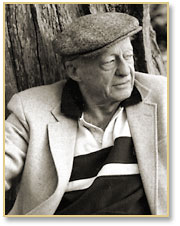| |
|||
|
| home >> Events
and Announcements >> Botkin
Lecture Series >> Botkin
Lecture Series Archives >> 2005 Botkin
Lectures >> Botkin Flyers: Kennedy
Lecture Benjamin Botkin Lecture Series: Texts from the Event Flyers Stetson Kennedy and "Building Democracy in America"Stetson Kennedy, folklorist, social activist and author, in conversation
with Peggy Bulger, Director of American Folklife Center
Stetson Kennedy: His Life and Work as Stetson Kennedy, 88, is a native of Florida who was the head of that state's Folklore Project of the Federal Writers' Project, a branch of the Works Progress Administration (WPA) that conducted unprecedented field research that resulted in the documentation of hundreds of traditional stories, songs, occupational culture and many other aspects of Florida's diverse cultural heritage. The most famous of the folklorists who worked under Kennedy's direction was the celebrated African American novelist and playwright, Zora Neale Hurston. The research done by Kennedy, Hurston and others was carried out from 1937 to 1942, and it produced one-of-a-kind sound recordings of ordinary men and women, photographs, researchers' notes and reports, and other documentary materials, which are now preserved at the Library of Congress. A book by Kennedy, Palmetto Country (1942), is a detailed survey of Florida folklife derived from the data he and his Federal Writers' Project colleagues compiled. Stetson Kennedy is also known for risking his life to infiltrate the Ku Klux Klan during the 1950s as an undercover agent for the Georgia Bureau of Investigation, learning the secret organization's beliefs and codes, and then leaking the information to columnist/broadcaster Drew Pearson who, in turn, exposed the Klan's nefarious work to the American public. Kennedy's book, The Klan Unmasked (1955), tells the story against the backdrop of African American human rights. Other books by Kennedy include Southern Exposure (1946), The Jim Crow Guide to the U.S.A.: The Laws, Customs and Etiquette Governing the Conduct of Nonwhites and Other Minorities as Second-Class Citizens (1973), and After Appomatox: How the South Won the War (1995) Another important facet of Kennedy's life is the friendships he forged with prominent writers, philosophers, and folklorists, including Richard Wright, Jean Paul Sartre, Simone de Beauvoir, Marjoie Kinnan Rawlings, Studs Turkel, Alan Lomax, Langston Hughes, Howard Fast, and Alice Walker. Beginning in the 1950s, Kennedy shared a deep friendship with Woody Guthrie, the legendary singer, song writer and social activist. Guthrie was a frequent visitor to Kennedy's 20-acre home, "Lake Beluthahatchee," south of Jacksonville, where he wrote the final draft of his autobiography. Stetson Kennedy's presentation will take place in Room 119 of the Thomas Jefferson Building of the Library of Congress. It will be introduced by Dr. Peggy Bulger, director of the American Folklife Center, whose doctoral dissertation is about Kennedy, and facilitated by Dr. John Y. Cole, an expert on the Federal Writers' Project who is the director of the Center for the Book at the Library of Congress. |
| |||

 Tuesday, May 24, 2005
Tuesday, May 24, 2005